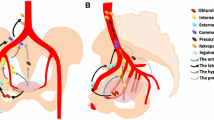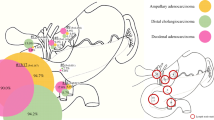Abstract
Background
Fluorescent lymphography (FL) using indocyanine green (ICG) allows for the visualization of all draining lymph nodes (LNs), thereby increasing LN retrieval. However, no studies have assessed the efficacy of FL in high body mass index (BMI) gastric cancer patients, even as LN yield decreases with increasing BMI in gastrectomy. This study aimed to investigate the influence of FL on LN retrieval in high BMI gastric cancer patients.
Methods
Gastric cancer patients who underwent laparoscopic or robotic gastrectomies from 2013 to 2021 were included. Patients were classified into two groups, with FL (FL group) or without FL (non-FL group). The effect of FL on LN retrieval was assessed by BMI. Inverse probability of treatment weighting (IPTW) was used to ensure comparability between groups.
Results
Retrieved LN number decreased as BMI increased regardless of FL application (P < 0.001). According to the IPTW analysis, the mean retrieved LN number was significantly higher in the FL group (48.4 ± 18.5) than in the non-FL group (39.8 ± 16.3, P < 0.001), irrespective of BMI. The FL group exhibited a significantly higher proportion of patients with 16 or more LNs (99.5%) than the non-FL group (98.1%, P < 0.001). The FL group also had a significantly higher proportion of patients with 30 or more LNs (86.6%) than the non-FL group (72.2%, P < 0.001). In both the normal and high-BMI patients, the FL group had a significantly larger percentage of patients with a higher nodal classification than the non-FL group.
Conclusion
FL resulted in more LN retrieval, even in high BMI patients. FL ensures accurate staging by maintaining the appropriate retrieved LN number in high BMI gastric cancer patients.




Similar content being viewed by others
Data availability
The data presented in this study are available upon request from the corresponding author.
References
Kinami S, Saito H, Takamura H. Significance of lymph node metastasis in the treatment of gastric cancer and current challenges in determining the extent of metastasis. Front Oncol. 2021;11: 806162.
Japanese Gastric Cancer A. Japanese gastric cancer treatment guidelines 2021 (6th edition). Gastric Cancer. 2021;2023(26):1–25.
Kim TH, Kim IH, Kang SJ, Choi M, Kim BH, Eom BW, et al. Korean practice guidelines for gastric cancer 2022: an evidence-based. Multidiscip Approach J Gastric Cancer. 2023;23:3–106.
Gholami S, Janson L, Worhunsky DJ, Tran TB, Squires MH 3rd, Jin LX, et al. Number of lymph nodes removed and survival after gastric cancer resection: an analysis from the US gastric cancer collaborative. J Am Coll Surg. 2015;221:291–9.
Woo Y, Goldner B, Ituarte P, Lee B, Melstrom L, Son T, et al. Lymphadenectomy with optimum of 29 lymph nodes retrieved associated with improved survival in advanced gastric cancer: a 25,000-patient international database study. J Am Coll Surg. 2017;224:546–55.
Hayashi S, Kanda M, Ito S, Mochizuki Y, Teramoto H, Ishigure K, et al. Number of retrieved lymph nodes is an independent prognostic factor after total gastrectomy for patients with stage III gastric cancer: propensity score matching analysis of a multi-institution dataset. Gastric Cancer. 2019;22:853–63.
Hanna GB, Amygdalos I, Ni M, Boshier PR, Mikhail S, Lloyd J, et al. Improving the standard of lymph node retrieval after gastric cancer surgery. Histopathology. 2013;63:316–24.
Schoenleber SJ, Schnelldorfer T, Wood CM, Qin R, Sarr MG, Donohue JH. Factors influencing lymph node recovery from the operative specimen after gastrectomy for gastric adenocarcinoma. J Gastrointest Surg. 2009;13:1233–7.
Dhar DK, Kubota H, Tachibana M, Kotoh T, Tabara H, Masunaga R, et al. Body mass index determines the success of lymph node dissection and predicts the outcome of gastric carcinoma patients. Oncology. 2000;59:18–23.
Kulig J, Sierzega M, Kolodziejczyk P, Dadan J, Drews M, Fraczek M, et al. Implications of overweight in gastric cancer: a multicenter study in a Western patient population. Eur J Surg Oncol. 2010;36:969–76.
Bickenbach KA, Denton B, Gonen M, Brennan MF, Coit DG, Strong VE. Impact of obesity on perioperative complications and long-term survival of patients with gastric cancer. Ann Surg Oncol. 2013;20:780–7.
Kwon IG, Son T, Kim HI, Hyung WJ. Fluorescent lymphography-guided lymphadenectomy during robotic radical gastrectomy for gastric cancer. JAMA Surg. 2019;154:150–8.
Baiocchi GL, Molfino S, Molteni B, Quarti L, Arcangeli G, Manenti S, et al. Fluorescence-guided lymphadenectomy in gastric cancer: a prospective western series. Updates Surg. 2020;72:761–72.
Roh CK, Choi S, Seo WJ, Cho M, Son T, Kim HI, et al. Indocyanine green fluorescence lymphography during gastrectomy after initial endoscopic submucosal dissection for early gastric cancer. Br J Surg. 2020;107:712–9.
Lee S, Song JH, Choi S, Cho M, Kim YM, Kim HI, et al. Fluorescent lymphography during minimally invasive total gastrectomy for gastric cancer: an effective technique for splenic hilar lymph node dissection. Surg Endosc. 2022;36:2914–24.
Alrashidi N, Kim KY, Park SH, Lee S, Cho M, Kim YM, et al. Fluorescent lymphography-guided lymphadenectomy during minimally invasive completion total gastrectomy for remnant gastric cancer patients. Cancers (Basel). 2022;14(20):5037.
Park SH, Kim KY, Cho M, Kim YM, Kim HI, Hyung WJ. Prognostic impact of fluorescent lymphography on gastric cancer. Int J Surg. 2023;109(10):2926–33.
Japanese Gastric Cancer A. Japanese gastric cancer treatment guidelines 2010 (ver. 3). Gastric Cancer. 2011;14:113–23.
Zeng Y, Chen LC, Ye ZS, Deng JY. Examined lymph node count for gastric cancer patients after curative surgery. World J Clin Cases. 2023;11:1930–8.
Wu XS, Wu WG, Li ML, Yang JH, Ding QC, Zhang L, et al. Impact of being overweight on the surgical outcomes of patients with gastric cancer: a meta-analysis. World J Gastroenterol. 2013;19:4596–606.
Voglino C, Di Mare G, Ferrara F, De Franco L, Roviello F, Marrelli D. Clinical and oncological value of preoperative BMI in gastric cancer patients: a single center experience. Gastroenterol Res Pract. 2015;2015: 810134.
Zhao B, Zhang J, Mei D, Luo R, Lu H, Xu H, et al. Does high body mass index negatively affect the surgical outcome and long-term survival of gastric cancer patients who underwent gastrectomy: a systematic review and meta-analysis. Eur J Surg Oncol. 2018;44:1971–81.
Jung MK, Cho M, Roh CK, Seo WJ, Choi S, Son T, et al. Assessment of diagnostic value of fluorescent lymphography-guided lymphadenectomy for gastric cancer. Gastric Cancer. 2021;24:515–25.
Li Z, Ao S, Bu Z, Wu A, Wu X, Shan F, et al. Clinical study of harvesting lymph nodes with carbon nanoparticles in advanced gastric cancer: a prospective randomized trial. World J Surg Oncol. 2016;14:88.
Yokota T, Ishiyama S, Saito T, Teshima S, Narushima Y, Murata K, et al. Lymph node metastasis as a significant prognostic factor in gastric cancer: a multiple logistic regression analysis. Scand J Gastroenterol. 2004;39:380–4.
Biffi R, Botteri E, Cenciarelli S, Luca F, Pozzi S, Valvo M, et al. Impact on survival of the number of lymph nodes removed in patients with node-negative gastric cancer submitted to extended lymph node dissection. Eur J Surg Oncol. 2011;37:305–11.
Acknowledgements
We acknowledge the assistance of Editage (www.editage.co.kr) for editing and reviewing this manuscript for English language usage.
Funding
Investigator Sponsored Research Program (ISR-2017–10924) and Covidien Private Limited (Medtronic).
Author information
Authors and Affiliations
Corresponding author
Ethics declarations
Conflict of interest
This study was supported by a grant from the Investigator Sponsored Research Program (ISR-2017–10924) and Covidien Private Limited (Medtronic). The funding sources played no role in the design of this study and did not play any role in study execution, data analysis, data interpretation, or the decision to submit the results for presentation or publication. W.J.H. had full access to all data in the study and took responsibility for the integrity of the data and the accuracy of data analysis. W.J.H. is a stockholder and chief executive officer of Hutom. He received research grants from Medtronic and GC Pharma. He provided consultancy services to SK Hynix (Wuxi) outside of the submitted work. The other authors declare no conflicts of interest.
Additional information
Publisher's Note
Springer Nature remains neutral with regard to jurisdictional claims in published maps and institutional affiliations.
Presentation: This work was presented at the 2022 Annual Meeting of KINGCA, Seoul, Republic of Korea, from September 1 to September 3, 2022.
Supplementary Information
Below is the link to the electronic supplementary material.
Rights and permissions
Springer Nature or its licensor (e.g. a society or other partner) holds exclusive rights to this article under a publishing agreement with the author(s) or other rightsholder(s); author self-archiving of the accepted manuscript version of this article is solely governed by the terms of such publishing agreement and applicable law.
About this article
Cite this article
Kim, KY., Hwang, J., Park, S.H. et al. Superior lymph node harvest by fluorescent lymphography during minimally invasive gastrectomy for gastric cancer patients with high body mass index. Gastric Cancer 27, 622–634 (2024). https://doi.org/10.1007/s10120-024-01482-w
Received:
Accepted:
Published:
Issue Date:
DOI: https://doi.org/10.1007/s10120-024-01482-w




